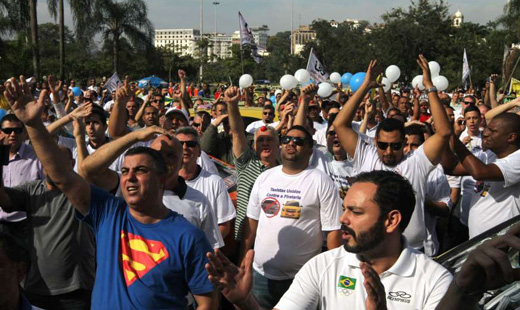
WASHINGTON – Progressive economists, policy strategists and labor representatives held a seminar here yesterday focusing on multi-billion dollar corporations that claim they’re not employers but merely managers of computer programs that allow customers to directly hire workers as needed.
These workers, the corporations say, are not employees entitled to rights under law. They are “independent contractors working for themselves” and entitled to virtually no rights at all.
Most participants in the seminar, sponsored by the Economic Policy Institute (EPI) and other progressive think tanks, agreed that the so-called “new” economy is just another scheme by corporations to attack workers’ rights.
They also agreed that the key to workers getting better wages, protections and conditions in the “new” economy is old-fashioned collective bargaining.
Among the largest of the computer-based corporations are the Uber and Lyft taxicab companies. They offer consumers a computer app by which they can directly contact a taxi that’s on the road near them. The Task Rabbit and Up Work corporations offer similar apps through which customers can hire workers to do everything from highly complex technical jobs to handyman tasks.
The corporations contend they are the wave of the future; a future in which most people will “work for themselves.” They call this future by various names: the “on-demand economy,” the “gig-sharing economy,” or the “peer-to-peer economy.”
This “new” economy also includes “permatemps.” These are people who do the same work in manufacturing plants as full time employees but are classified as “temporary” workers and “independent contractors.” They receive no benefits and less pay than their full time co-workers.
Employers try to get away with these schemes all across the economy. Walmart, for example, calls its warehouse workers “independent contractors” by paying low wage firms that it contracts to hire people for warehouse jobs, pay them low wages and allow itself to take no responsibility for working conditions, salary or benefits.
California truck drivers working on the docks have also been called “independent contractors” with no rights as workers. (See accompanying video:)
At the EPI seminar, economic researcher Steven Hill explained that workers in the so-called “new” economy are only paid for actual time worked. They must pay for their own training. Furthermore, they are often forced to bid against each other for jobs. The cheapest bid wins. The result: a spiraling race to the bottom.
Hill’s latest book is called Raw Deal: How the “Uber Economy” and Naked Capitalism Are Screwing American Workers.
Technology is not to blame; greed is
Many analysts say that the drift toward the “new” economy is an inevitable product of new computer technologies. However, at the seminar, EPI President Larry Mishel showed it is a product of policies that allow the wealthy and powerful to run roughshod over working people in order to pump up profits.
In fact, Mishel said, there are so many other ways that corporations are being allowed to destroy workers’ rights and to give lower pay and benefits that the so-called “new” economy has accounted for only 10 or 12 percent of the whole economy since 1995.
Mishel said that “new” economy workers can only be protected by policies that protect all workers.
These policies include enforcing existing state and federal laws that clearly define the differences between an “employee” and an “independent contractor.” In fact, many states are already cracking down on employers who try to avoid their responsibilities by misclassifying workers as independent contractors.
Furthermore, Mishel said, “A necessary condition for ending wage suppression is economic policies that ensure every worker who wants a job can find one. In the absence of full employment, employers do not need to offer significant wage increases to attract and retain employees.”
Mishel said that the most important tool for protecting workers rights remains what it’s always been: collective bargaining.
“Collective bargaining,” he said, “is the central feature of a re-invigorated economy.”
Working people, he said, should continue to push for laws and regulations that encourage, instead of discourage, collective bargaining.
Participants in the seminar pointed out that even without new laws there is a resurgence of union organizing in all sectors of the economy and that this will help workers who find themselves stuck in the “new economy.”
Video: Rossana Cambron/PW
Photo: Companies around the world are using the so called “new economy” model to exploit workers. Here, cab drivers in Rio de Janeiro, Brazil protest the “ride share” mogul Uber which they say pulls customers away from the safe, unionized taxi services and draws them into unregulated services while it exploits the drivers who, as so called independent contractors, have none of the rights of regular workers. | AP

MOST POPULAR TODAY

High Court essentially bans demonstrations, freedom of assembly in Deep South

Zionist organizations leading campaign to stop ceasefire resolutions in D.C. area

U.S. imperialism’s ‘ironclad’ support for Israel increases fascist danger at home

UN warns that Israel is still blocking humanitarian aid to Gaza







Comments